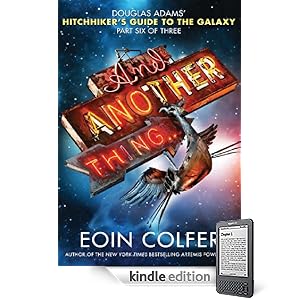 A couple of years ago I re-read the five books in Douglas Adams's Hitchhiker's Guide trilogy, back to back, something I'd never done previously. Like most people, I read them as they came out, at least the last few. On rereading them, I came to two conclusions. First, that the last two were darned good books, and any panning that they got relative to the earlier ones was largely undeserved. And second, that the tone and style changed incredibly during the course of the books. If you had the first book in your memory but several years old when you dove into the fifth, it feels similar; you'll note differences, of course, but nowhere near as much as reading them straight through. Douglas was practically a different writer at the end, because he wasn't writing for radio and then adapting, because he was exhausted and weary of that world and its characters, and because his style had matured in a lot of ways. The latter books were probably panned by people who wanted the punchy, madcap one-liner-filled momentum of the first books, and who weren't ready to give the latter books a chance on their own terms.
A couple of years ago I re-read the five books in Douglas Adams's Hitchhiker's Guide trilogy, back to back, something I'd never done previously. Like most people, I read them as they came out, at least the last few. On rereading them, I came to two conclusions. First, that the last two were darned good books, and any panning that they got relative to the earlier ones was largely undeserved. And second, that the tone and style changed incredibly during the course of the books. If you had the first book in your memory but several years old when you dove into the fifth, it feels similar; you'll note differences, of course, but nowhere near as much as reading them straight through. Douglas was practically a different writer at the end, because he wasn't writing for radio and then adapting, because he was exhausted and weary of that world and its characters, and because his style had matured in a lot of ways. The latter books were probably panned by people who wanted the punchy, madcap one-liner-filled momentum of the first books, and who weren't ready to give the latter books a chance on their own terms.So when word came that another author was going to take over the series for a sixth book, I was dubious, sure, but perhaps more willing to give it a chance than many, because unlike most, I realized that we'd already had two books by a different author, effectively, that were damned good. Eoin Colfer (whose other works I'd never read) only had to make sure not to try to emulate the style of any of the Douglas Adams we'd met, but just tell another story in the same genre and setting, and if he was good, that'd be enough.
Reading it was delayed for a while since Hyperion was standing by Penguin Publishing's head-up-ass idea of how eBooks should be priced (more expensive than the paperback -- of course!) and I wasn't willing to pay that price. But unlike Penguin, Hyperion eventually lowered their price to just slightly below the dead-tree edition.
On concluding it, I can safely say I do not regret the money or time spent. I enjoyed the book without reservation.
I'll admit the beginning takes a little while to get into, sometimes the characters (especially Ford Prefect) don't seem quite like the ones we know (though Ford's role in the book is fairly slim so it's not that big a deal), and the story differs from the Adams books in one striking regard: there's a story that takes up most of the book and goes through a beginning, middle, and ending with resolution. (Not that Adams never dabbled in that, and not that And Another Thing was one coherent storyline on its own, but I definitely smelled a lot more literary structure than in other Hitchhiker books.)
It had as much comedy as the middle books in the series (that is, more than the latter, and less than the former), and as much interesting exploration of this universe, and of the characters we're familiar with. And most of the characters registered as true. Notably, Arthur and Zaphod felt entirely like Arthur and Zaphod. (Trillian too, to some extent, though Trillian's been reinventing herself every book for a while anyway, and continues to do so here.)
Colfer does the right thing: he writes his own book in his own style, with nods to Adams rather than imitation, and set in the universe Adams created but telling a new story. He also did a very good job of dealing with how thoroughly Adams ended the story at the end of Mostly Harmless (though this does mean the first few chapters are a little less engaging, which I fear will make some people get turned off before the book starts to get into more familiar ground).
I recommend the book to fans of the original series, provided they're willing to judge it on its own merits, for what it is. If you come to it that way, I think you'll find it a worthwhile read.

 RealTime and RTC
RealTime and RTC Prism
Prism Uncreated
Uncreated Bloodweavers
Bloodweavers Foulspawner's Legacy
Foulspawner's Legacy Lusternia
Lusternia
No comments:
Post a Comment